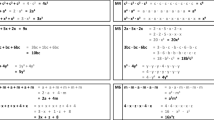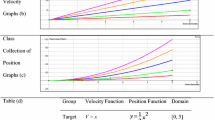Abstract
This study examines a sequence of four middle school algebra tasks through their enactment in three teachers’ classrooms. The analysis centers on the cognitive demand—the kinds of thinking processes entailed in solving the task—and the participatory demand—the kinds of verbal contributions expected of students—of the task as written in the instructional materials, as set up by the three teachers, and as discussed by the teachers and their students. Relationships between the nature of the task enactments and students’ performance on a pre- and post-test are explored. Findings include the fact that the enacted tasks differed from the written tasks with regard to both the cognitive demand and the participatory demand, which related to students’ lack of success on the post-test. Specifically, cognitive demand declined in the enacted curriculum at different points for different classes, and the participatory demand during enactment tended to involve isolated mathematical terms rather than students verbally expressing mathematical relations.




Similar content being viewed by others
References
Bergem, O. K., & Klette, K. (2010). Mathematical tasks as catalysts for student talk: Analysing discourse in a Norwegian mathematics classroom. In Y. Shimizu, B. Kaur, R. Huang, & D. Clarke (Eds.), Mathematical tasks in classrooms around the world (pp. 35–62). Boston: Sense Publishers.
Carraher, D. W., & Schliemann, A. D. (2007). Early algebra and algebraic reasoning. In F. K. Lester Jr (Ed.), Second handbook of research on mathematics teaching and learning (pp. 669–706). Charlotte: Information Age.
Chazan, D. (1996). Algebra for all students? The algebra policy debate. Journal of Mathematical Behavior, 15, 455–477.
Clarke, D., Emanuelsson, J., Jablonka, E., & Mok, I. A. C. (Eds.). (2006). Making connections: Comparing mathematics classrooms around the world. Boston: Sense Publishers.
Cobb, P., Yackel, E., & Wood, T. (1992). A constructivist alternative to the representational view of mind in mathematics education. Journal for Research in Mathematics Education, 23, 2–33.
da Ponte, J. P. (2007). Investigations and explorations in the mathematics classroom. The International Journal on Mathematics Education, 39, 419–430.
DeBoer, G., Morris, K., Roseman, J. E., Wilson, L., Capraro, M. M., Capraro, R., Manon, J. (2004, April). Research issues in the improvement of mathematics teaching and learning through professional development. Paper presented at the annual meeting of the American Educational Research Association, San Diego, CA.
Henningsen, M., & Stein, M. K. (1997). Mathematical tasks and student cognition: Classroom-based factors that support and inhibit high-level mathematical thinking and reasoning. Journal for Research in Mathematics Education, 28, 524–549.
Herbel-Eisenmann, B. A., & Otten, S. (2011). Mapping mathematics in classroom discourse. Journal for Research in Mathematics Education, 42, 451–485.
Herbel-Eisenmann, B., Steele, M., & Cirillo, M. (2013). (Developing) teacher discourse moves: A framework for professional development. Mathematics Teacher Educator, 1, 181–196.
Hufferd-Ackles, K., Fuson, K. C., & Sherin, M. G. (2004). Describing levels and components of a math-talk learning community. Journal for Research in Mathematics Education, 35, 81–116.
Jackson, K., Garrison, A., Wilson, J., Gibbons, L., & Shahan, E. (2013). Exploring relationships between setting up complex tasks and opportunities to learn in concluding whole-class discussions in middle-grades mathematics instruction. Journal for Research in Mathematics Education, 44, 646–682.
Jansen, A. (2008). An investigation of relationships between seventh-grade students’ beliefs and their participation during mathematics discussions in two classrooms. Mathematical Thinking and Learning, 10, 68–100.
Lappan, G., Fey, J. T., Fitzgerald, W. M., Friel, S. N., & Phillips, E. D. (1998a). The connected mathematics project (2nd ed.). Menlo Park: Dale Seymour.
Lappan, G., Fey, J. T., Fitzgerald, W. M., Friel, S. N., & Phillips, E. D. (1998b). Connected mathematics: Variables and patterns, teacher’s guide (2nd ed.). Upper Saddle River: Pearson Prentice Hall.
Mehan, H. (1979). “What time is it, Denise?”: Asking known information questions in classroom discourse. Theory into Practice, 18, 285–294.
National Council of Teachers of Mathematics. (1989). Curriculum and evaluation standards for school mathematics. Reston: Author.
National Council of Teachers of Mathematics. (2000). Principles and standards for school mathematics. Reston: Author.
Nie, B., Cai, J., & Moyer, J. C. (2009). How a standards-based mathematics curriculum differs from a traditional curriculum: With a focus on intended treatments of the ideas of variable. The International Journal on Mathematics Education, 41, 777–792.
Otten, S. (2012). Exploring cognitive demand, student participation, and learning in middle school algebra. In L. R. Van Zoest, J.-J. Lo & J. L. Kratky (Eds.), Proceedings of the 34th annual meeting of the North American Chapter of the International Group for the Psychology of Mathematics Education (pp. 359–362). Kalamazoo, MI: Western Michigan University.
Pepin, B., & Haggarty, L. (2001). Mathematics textbooks and their use in English, French, and German classrooms: A way to understand teaching and learning cultures. The International Journal on Mathematics Education, 33, 158–175.
Remillard, J. T. (2005). Examining key concepts in research on teachers’ use of mathematics curricula. Review of Educational Research, 75, 211–246.
Senk, S. L., & Thompson, D. R. (Eds.). (2003). Standards-based school mathematics curricula: What are they? What do students learn?. Mahwah: Lawrence Erlbaum.
Sfard, A. (2008). Thinking as communicating: Human development, the growth of discourses, and mathematizing. Cambridge: Cambridge University Press.
Smith, M. S., & Stein, M. K. (2011). 5 practices for orchestrating productive mathematics discussions. Reston: National Council of Teachers of Mathematics.
Stein, M. K., Grover, B. W., & Henningsen, M. (1996). Building student capacity for mathematical thinking and reasoning: An analysis of mathematical tasks used in reform classrooms. American Educational Research Journal, 33, 455–488.
Stein, M. K., & Lane, S. (1996). Instructional tasks and the development of student capacity to think and reason: An analysis of the relationship between teaching and learning in a reform mathematics project. Educational Research and Evaluation, 2, 50–80.
Stein, M. K., Smith, M. S., Henningsen, M. A., & Silver, E. A. (2000). Implementing standards-based mathematics instruction: A casebook for professional development. New York: Teachers College Press.
Tarr, J. E., Reys, R. E., Reys, B. J., Chávez, O., Shih, J., & Osterlind, S. J. (2008). The impact of middle grades mathematics curricula and the classroom learning environment on student achievement. Journal for Research in Mathematics Education, 39, 247–280.
Webel, C. (2013). High school students’ goals for working together in mathematics class: Mediating the practical rationality of studenting. Mathematical Thinking and Learning, 15, 24–57.
Acknowledgments
This study was partially supported by the Michigan State University College of Natural Science. We thank Beth Herbel-Eisenmann, Ralph Putnam, Kristen Bieda, and Michael Steele for their guidance and support of this study. We also thank Kimberly Cervello Rogers, Project 2061, and all participating teachers and students.
Author information
Authors and Affiliations
Corresponding author
Appendix: Selected items from the pre- and post-tests
Appendix: Selected items from the pre- and post-tests

Rights and permissions
About this article
Cite this article
Otten, S., Soria, V.M. Relationships between students’ learning and their participation during enactment of middle school algebra tasks. ZDM Mathematics Education 46, 815–827 (2014). https://doi.org/10.1007/s11858-014-0572-4
Accepted:
Published:
Issue Date:
DOI: https://doi.org/10.1007/s11858-014-0572-4




